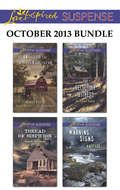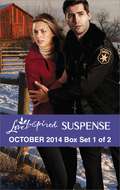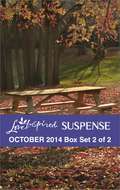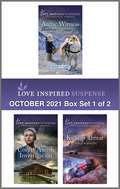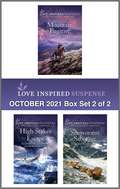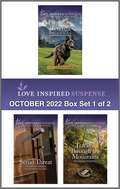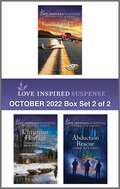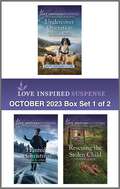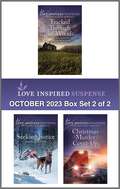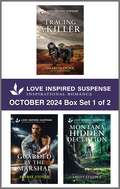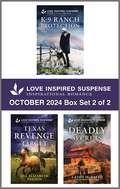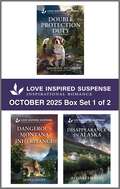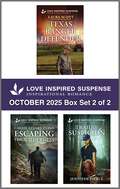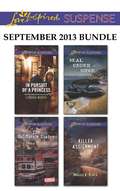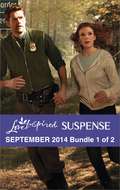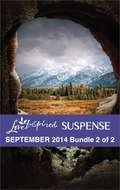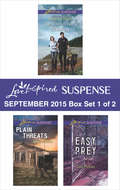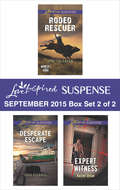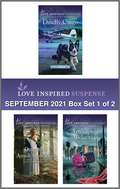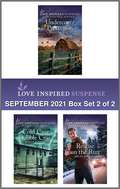- Table View
- List View
Love Inspired Suspense October 2013 Bundle
by Marta Perry Kit Wilkinson Diane Burke Kathleen Tailer Susan Sleeman Katy LeeLove Inspired Suspense brings you four new titles for one great price, available now for a limited time only from November 1 to November 30! Enjoy these contemporary heart-pounding tales of suspense, romance, hope and faith. This Love Inspired Suspense bundle includes High-Stakes Holiday Reunion by Christy Barritt, Her Mistletoe Protector by Laura Scott, Montana Standoff by Sharon Dunn and Texas K-9 Unit Christmas by Shirlee McCoy and Terri Reed. Look for four new inspirational suspense stories every month from Love Inspired Suspense!
Love Inspired Suspense October 2013 Bundle
by Kathleen Tailer Susan Sleeman Katy LeeLove Inspired Suspense brings you four new titles for one great price, available now for a limited time only from October 1 to October 31! Enjoy these contemporary heart-pounding tales of suspense, romance, hope and faith. This Love Inspired Suspense bundle includes Danger in Amish Country by Marta Perry, Diane Burke and Kit Wilkinson, Thread of Suspicion by Susan Sleeman, The Reluctant Witness by Kathleen Tailer and Warning Signs by Katy Lee.Look for four new inspirational suspense stories every month from Love Inspired Suspense!
Love Inspired Suspense October 2013 Bundle
by Kathleen Tailer Susan Sleeman Katy LeeLove Inspired Suspense brings you four new titles for one great price, available now for a limited time only from October 1 to October 31! Enjoy these contemporary heart-pounding tales of suspense, romance, hope and faith. This Love Inspired Suspense bundle includes Danger in Amish Country by Marta Perry, Diane Burke and Kit Wilkinson, Thread of Suspicion by Susan Sleeman, The Reluctant Witness by Kathleen Tailer and Warning Signs by Katy Lee.Look for four new inspirational suspense stories every month from Love Inspired Suspense!
Love Inspired Suspense October 2013 Bundle
by Kathleen Tailer Susan Sleeman Katy LeeLove Inspired Suspense brings you four new titles for one great price, available now for a limited time only from October 1 to October 31! Enjoy these contemporary heart-pounding tales of suspense, romance, hope and faith. This Love Inspired Suspense bundle includes Danger in Amish Country by Marta Perry, Diane Burke and Kit Wilkinson, Thread of Suspicion by Susan Sleeman, The Reluctant Witness by Kathleen Tailer and Warning Signs by Katy Lee.Look for four new inspirational suspense stories every month from Love Inspired Suspense!
Love Inspired Suspense October 2014 - Box Set 1 of 2
by Debby Giusti Lynette Eason Sarah VarlandMore of the suspense you love-now Love Inspired Suspense brings you six new titles, in two convenient bundles! Enjoy these contemporary heart-pounding tales of suspense, romance, hope and faith. This Love Inspired Suspense bundle includes The Lawman Returns by Lynette Eason, Holiday Defenders by Debby Giusti, Susan Sleeman and Jodie Bailey and Tundra Threat by Sarah Varland. Look for six new inspirational suspense stories every month from Love Inspired Suspense!
Love Inspired Suspense October 2014 - Box Set 2 of 2
by Laura Scott Hope White Jane M. ChoateMore of the suspense you love-now Love Inspired Suspense brings you six new titles, in two convenient bundles! Enjoy these contemporary heart-pounding tales of suspense, romance, hope and faith. This Love Inspired Suspense bundle includes Down to the Wire by Laura Scott, Covert Christmas by Hope White and Keeping Watch by Jane M. Choate. Look for six new inspirational suspense stories every month from Love Inspired Suspense!
Love Inspired Suspense October 2014 Box Set 1 of 2
by Debby Giusti Lynette Eason Susan Sleeman Jodie Bailey Sarah VarlandLove Inspired Suspense October 2014 Box Set 1 of 2
Love Inspired Suspense October 2014 Box Set 2 of 2
by Laura Scott Hope White Jane M. ChoateLove Inspired Suspense October 2014 Box Set 2 of 2
Love Inspired Suspense October 2021 - Box Set 1 of 2
by Heather Woodhaven Dana R. Lynn Anne GalbraithLove Inspired Suspense brings you three new titles! Enjoy these suspenseful romances of danger and faith. This box set includes:ARCTIC WITNESS (An Alaska K-9 Unit novel)ByHeather WoodhavenWhen his ex-wife goes missing in the Alaskan wilderness after discovering a body, Alaska State Trooper Sean West and his K-9 partner, Grace, rescue her from a kidnapper. Now the murderer is on their trail, and it&’s up to Sean to protect Ivy and the little boy she plans to adopt. COVERT AMISH INVESTIGATION (An Amish Country Justice novel)By USA TODAY bestselling author Dana R. LynnPolice officer Kate Bontrager never planned to return to her Amish roots, but with a woman missing from witness protection in Kate&’s former community, she has no choice. The moment she arrives for her undercover assignment, she becomes a target…and working with her ex, Abram Burkholder, is her only hope of staying alive. KIDNAP THREATBy Anne GalbraithA mole in the police department thrusts a witness&’s mother right into a deadly gang&’s crosshairs. They&’ll kill anyone to keep Alice Benoit&’s son from testifying. Now it&’s up to officer Ben Parsons to protect Alice for twenty-four hours in a busy city…or a killer could go free.For more stories filled with danger and romance, look for Love Inspired Suspense October 2021 Box Set – 2 of 2
Love Inspired Suspense October 2021 - Box Set 2 of 2
by Lynette Eason Kerry Johnson Elizabeth GoddardLove Inspired Suspense brings you three new titles at a great value, available now! Enjoy these suspenseful romances of danger and faith.This box set includes: MOUNTAIN FUGITIVEBy Lynette EasonOut on a horseback ride, Dr. Kathrine Gilroy stumbles into the middle of a shoot-out. Now with US Marshal Dominic O&’Ryan injured and under her care, she&’s determined to help him find the fugitive who killed his partner…before they both end up dead. HIGH STAKES ESCAPE (A Mount Shasta Secrets novel)By USA TODAY Bestselling Author Elizabeth GoddardSomeone is killing off deputy US marshal Ben Bradley&’s witnesses one by one, and he won&’t let Chasey Cook become the next victim. But on the run with a leak in the Marshals Service and murderers drawing closer, he and Chasey have no one to trust. Can he shield her from danger on his own? SNOWSTORM SABOTAGEBy Kerry JohnsonAfter single mom Everly Raven finds her friend murdered inside a chalet on her family&’s ski resort, the blame falls on her. With a blizzard closing in and the killer&’s henchmen chasing her down a mountain, Everly must work with FBI agent Isaac Rhodes—the father of her secret child—to clear her name. For more stories filled with danger and romance, look for Love Inspired Suspense October 2021 Box Set – 1 of 2
Love Inspired Suspense October 2022 - Box Set 1 of 2
by Valerie Hansen Maggie K. Black Rhonda StarnesLove Inspired Suspense brings you three new titles! Enjoy these suspenseful romances of danger and faith. This box set includes: EXPLOSIVE REVENGE (A Rocky Mountain K-9 Unit novel)by USA TODAY bestselling author Maggie K. BlackAfter months of someone sabotaging their K-9 unit, Sargent Tyson Wilkes and K-9 Echo must scramble to uncover the culprit before their unit is disbanded. But when all signs point to a link with Detective Skylar Morgan&’s drug case, will working together be enough to stop the criminal…and keep them alive? SERIAL THREAT (An Emergency Responders novel)by USA TODAY bestselling author Valerie HansenA series of murders in her small Missouri town leads police officer Emily Zwalt straight to old friend and attorney Noah Holden. With connections to all the victims, Noah&’s the main suspect. He&’ll have to enlist Emily&’s aid to unmask the real killer before he can strike again. TRACKED THROUGH THE MOUNTAINSby Rhonda StarnesWhen FBI profiler Sawyer Eldridge receives chilling threats from a serial killer who abducts his half-sister for revenge, he enlists bodyguard Bridget Vincent to track down the murderer. Except Bridget&’s also on the hit list and saving them both might not be possible… For more stories filled with danger and romance, look for Love Inspired Suspense October 2022 Box Set – 2 of 2
Love Inspired Suspense October 2022 - Box Set 2 of 2
by Laurie Alice Eakes Terri Reed Sharon DunnLove Inspired Suspense brings you three new titles! Enjoy these suspenseful romances of danger and faith. This box set includes: FORCED TO FLEEby Terri ReedDiscovering a family secret instantly marks reserved banker Abby Frost as the target of a vicious cartel searching for her father. Tasked with keeping her safe, can US Marshal Jace Armstrong help Abby find the answers that&’s she looking for about her true identity before she falls into the crime ring&’s clutches? CHRISTMAS HOSTAGEby Sharon DunnTaken hostage by bank robbers, security expert Laura Devin suspects one of the thieves is not who he appears to be. And when undercover FBI Agent Hollis Pryce is forced to blow his cover to free Laura, he&’ll risk everything to assist her escape from the Montana mountains and the criminal mastermind hunting them… ABDUCTION RESCUEby Laurie Alice EakesDesperate to find his missing sister, Ethan McClure seeks out private investigator Melissa &“Mel&” Carter—only to be attacked right outside her agency&’s door. Though she&’s reluctant to help after her last case turned violent, Mel won&’t turn Ethan away. But can they avoid becoming pawns in the abductor&’s dangerous game? For more stories filled with danger and romance, look for Love Inspired Suspense October 2022 Box Set – 1 of 2
Love Inspired Suspense October 2023 - Box Set 1 of 2
by Maggie K. Black Dana R. Lynn Connie QueenLove Inspired Suspense brings you three new titles! Enjoy these suspenseful romances of danger and faith. This box set includes: UNDERCOVER OPERATION (A Pacific Northwest K-9 novel)by USA TODAY Bestselling Author Maggie K. BlackAfter three bloodhound puppies are stolen, K-9 officer Asher Gilmore and trainer Peyton Burns are forced to go undercover as married drug smugglers to rescue them. But infiltrating the criminals will be more dangerous than expected, putting the operation, the puppies and their own lives at risk. HUNTED AT CHRISTMAS (An Amish Country Justice novel)by USA TODAY Bestselling Author Dana R. LynnWhen single mother Addison Johnson is attacked by a hit man, she learns there&’s a price on her head. Soon it becomes clear that Isaiah Bender—the bounty hunter hired to track her down for crimes she didn&’t commit—is her only hope for survival. RESCUING THE STOLEN CHILDby Connie QueenWhen Texas Ranger Zane Adcock&’s grandson is kidnapped and used as leverage to get Zane to investigate an old murder case, he calls his ex-fiancée for help. Zane and retired US marshal Bliss Walker will risk their lives to take down the criminals…and find the missing boy before it&’s too late. For more stories filled with danger and romance, look for Love Inspired Suspense October 2023 Box Set – 2 of 2
Love Inspired Suspense October 2023 - Box Set 2 of 2: Box Set 2 Of 2
by Laura Scott Sharee Stover Shannon RedmonLove Inspired Suspense brings you three new titles! Enjoy these suspenseful romances of danger and faith. This box set includes: TRACKED THROUGH THE WOODSby USA TODAY Bestselling Author Laura ScottAbby Miller is determined to find her missing FBI informant father before the mafia does, but time is running out. Can she trust special agent Wyatt Kane to protect her from the gunmen on her trail, to locate her father—and to uncover an FBI mole? SEEKING JUSTICEby Sharee StoverWith her undercover operation in jeopardy, FBI agent Tiandra Daugherty replaces her injured partner with his identical twin brother, Officer Elijah Kenyon. But saving her mission puts Elijah in danger. Can Tiandra and her K-9 keep him alive before he becomes the next target? CHRISTMAS MURDER COVER-UPby Shannon RedmonAfter Detective Liz Burke finds her confidential informant dead and interrupts the killer's escape, she's knocked unconscious and struggles to remember the details of the murder. With a target on her back, she must team up with homicide detective Oz Kelly to unravel a deadly scheme—and stay alive. For more stories filled with danger and romance, look for Love Inspired Suspense October 2023 Box Set – 1 of 2
Love Inspired Suspense October 2024 - Box Set 1 of 2
by Sharon Dunn Sharee Stover Amity SteffenLove Inspired Suspense brings you three new titles! Enjoy these suspenseful romances of danger and faith.This box set includes: TRACING A KILLER (A Mountain Country K-9 Unit novel)by USA TODAY bestselling author Sharon DunnWhile tasked with protecting Trevor Gage from a serial killer, K-9 officer Hannah Scott inadvertently puts a second cold case murderer on their trail. The man who drowned Hannah&’s childhood friend is back—and he wants to make Hannah his next victim. Guarding Trevor becomes a survival mission once they both become the target of ruthless criminals. On a remote island with only each other to rely on, there&’s nowhere to run. And with twice the deadly traps, any misstep could prove fatal.GUARDED BY THE MARSHALby Sharee StoverWhen police chief Dani Fontaine gets an emergency call, she never expects to be ambushed by gunfire—or to find her friend&’s abandoned baby. Now Dani must keep the child safe, while evading assailants and investigating a leak in her department. And that means working with Deputy US Marshal Beckham Walsh, the man who almost destroyed her career. Protecting a child while searching for stolen weapons becomes more perilous at every turn. And with a target on their backs and multiple suspects, it could be their deadliest mission yet…MONTANA HIDDEN DECEPTIONby Amity SteffenNurse Nina Montgomery finds herself evading gunfire in the woods of Montana after unknowingly stumbling upon a man burying evidence of his crimes. When slashed tires and an explosion make it clear that the criminal knows Nina&’s identity, Detective Mateo Bianchi races to search for a deadly assailant who will stop at nothing to silence Nina and keep the truth hidden. Can they brave the wilderness and unmask a hidden killer, or will they find themselves the next victims?For more stories filled with danger and romance, look for Love Inspired Suspense October 2024 Box Set – 2 of 2
Love Inspired Suspense October 2024 - Box Set 2 of 2
by Jill Elizabeth Nelson Cathy McDavid Darlene L. TurnerLove Inspired Suspense brings you three new titles! Enjoy these suspenseful romances of danger and faith.This box set includes: K-9 RANCH PROTECTION (A Crisis Rescue Team novel)by Darlene L. TurnerPolice constable Izzy Tremblay knows her father&’s death was no accident, so when she finally discovers a lead and is immediately attacked, her suspicions are confirmed. The ambush leaves her in the hospital with three hours of crucial memory missing, which she knows holds the key to finding her father&’s murderer. For protection, she takes refuge with her ex-partner, Austin Murray, on his K-9 ranch while she races to uncover the truth. But with danger still lurking, can they stay alive long enough to take down a killer?TEXAS REVENGE TARGETby Jill Elizabeth NelsonAfter Texas Ranger Brianna Macguire catches up with the fugitive she&’s hunting, she finds herself ensnared in the crosshairs of a revenge-driven cartel—and evading a sniper attack. Cameron Wolfe, a man in hiding and with a bounty on his head, offers Bree shelter…only for Cameron&’s secrets and Bree&’s attackers to catch up with them both. While they're on the run in the Texas desert, danger stalks them at every turn. Can they outwit their relentless enemies before they both lose their lives?DEADLY SECRETSby New York Times bestselling author Cathy McDavidRancher Ridge Burnham unearths a gun and a strongbox of cash on his property—possible leads in his father&’s unsolved murder. The sheriff&’s department has ignored the case for years, but rookie deputy Elena Tomes is determined to prove herself by helping him find the truth. Faced with the town&’s sordid history of drug running, Elena and Ridge must work together and trust each other. Now this decades-old cold case will expose the rot in their small ranching community…and the secrets that someone will kill for.For more stories filled with danger and romance, look for Love Inspired Suspense October 2024 Box Set – 1 of 2
Love Inspired Suspense October 2025 - Box Set 1 of 2
by Sharon Dunn Elisabeth Rees Jenna NightLove Inspired Suspense brings you three new titles! Enjoy these suspenseful romances of danger and faith.This box set includes:DOUBLE PROTECTION DUTY (A Dakota K-9 Unit novel)by USA TODAY bestselling author Sharon DunnA family trip to the Wind Caves National Park quickly turns into a nightmare when K-9 officer Kenyon Graves discovers one of his twin boys has been abducted. Now Kenyon needs the help of his team and his longtime friend Raina McCord to save his toddler son. But the kidnappers are elusive—and intent on killing anyone who stands in the way of their sinister scheme. With threats closing in, time is of the essence to catch these criminals…before Kenyon and Raina pay the ultimate price.DANGEROUS MONTANA INHERITANCE (A Big Sky First Responders novel)by Jenna NightAttacked on the property she unexpectedly inherited, Rose Balfour barely escapes with the help of former hostage negotiator Henry Walsh. Someone is determined to keep her from testifying at a loan shark&’s murder trial. But when she does and the danger continues, Rose suspects there are answers in the house left to her. Teaming up with Henry, Rose uncovers surprising evidence and a powerful enemy determined to silence them. Not even Henry&’s isolated ranch is a safe refuge. With their lives on the line and captors closing in, can Rose and Henry expose the web of secrets—before they vanish forever?DISAPPEARANCE IN ALASKAby Elisabeth ReesThe last thing Ava Kindred remembers before being thrown off a cliff and left for dead in the Alaskan wilderness is witnessing her friend&’s abduction. And when she&’s saved by local police chief Mark Tremblay, she enlists his help to track her down. Except no trace of this woman&’s existence can be found and their search only leads to dead ends. But they can&’t deny that Ava&’s life is in danger. With time running out and unknown enemies just steps behind, can they discover what really happened before Ava&’s permanently silenced?For more stories filled with danger and romance, look for Love Inspired Suspense October 2025 Box Set – 2 of 2
Love Inspired Suspense October 2025 - Box Set 2 of 2
by Laura Scott Carrie Stuart Parks Jennifer PierceLove Inspired Suspense brings you three new titles! Enjoy these suspenseful romances of danger and faith.This box set includes:TEXAS RANGER DEFENDER (A Texas Justice novel) by USA TODAY bestselling author Laura ScottWhen Texas ranger Tucker Powell hears gunshots on his ranch and finds a woman in bloodstained clothes who is desperate for help, he offers her shelter. She claims to have no memories of who she is or how she got there, but is certain that she&’s in danger. And when Tucker discovers a dead body on his property and more bullets start flying, he is determined to unravel the mystery. But will the search for answers prove her innocent of murder…or cost them both their lives?ESCAPING THE WILDERNESSby Carrie Stuart ParksAmanda Cotton&’s privileged life takes a harrowing turn when her grandfather&’s dying wish places a target firmly on her back and she&’s attacked by unknown assailants. Rescue comes in the form of widowed outdoorsman Boone McGregor, but the threat is just beginning. Unable to trust local law enforcement, they flee across the rugged Montana mountains. As they evade deadly enemies and navigate harsh terrain, they must put aside their differences to survive. But when a family secret is exposed, danger is closer than they imagined and more than just their lives is at stake…TRAIL OF SUSPICIONby Jennifer PierceWhen crime scene technician Aurora &“Rory&” James and her K-9, Moose, stumble upon a dead body in the woods, she finds herself fighting off a killer who wants to hide his crimes. Although she&’s the criminal&’s next target, Rory doesn&’t want protection from Sergeant Asher Mitchell—the man who implicated her father in her mother&’s disappearance years ago. But as the attacks escalate and they discover that a second body belongs to Rory&’s missing mother, Asher realizes that the murderer will do anything to stop the police investigation. Can Rory and Asher catch the culprit before they become the next victims?For more stories filled with danger and romance, look for Love Inspired Suspense October 2025 Box Set – 1 of 2
Love Inspired Suspense September 2013 Bundle
by Lenora Worth Debby Giusti Liz Johnson Maggie K. BlackLove Inspired Suspense brings you four new titles for one great price, available now for a limited time only from September 1 to September 30! Enjoy these contemporary heart-pounding tales of suspense, romance, hope and faith. This Love Inspired Suspense bundle includes In Pursuit of a Princess by Lenora Worth, The Soldier's Sister by Debby Giusti, SEAL Under Siege by Liz Johnson and Killer Assignment by Maggie K. Black.Look for four new inspirational suspense stories every month from Love Inspired Suspense!
Love Inspired Suspense September 2014 - Bundle 1 of 2
by Terri Reed Christy Barritt Lisa PhillipsMore of the suspense you love-now Love Inspired Suspense brings you six new titles, in two convenient bundles! Enjoy these contemporary heart-pounding tales of suspense, romance, hope and faith. This Love Inspired Suspense bundle includes Danger at the Border by Terri Reed, Desperate Measures by Christy Barritt and Star Witness by Lisa Phillips. Look for six new inspirational suspense stories every month from Love Inspired Suspense!
Love Inspired Suspense September 2014 - Bundle 2 of 2
by Vickie Mcdonough Sharon Dunn Katy LeeMore of the suspense you love-now Love Inspired Suspense brings you six new titles, in two convenient bundles! Enjoy these contemporary heart-pounding tales of suspense, romance, hope and faith. This Love Inspired Suspense bundle includes Wilderness Target by Sharon Dunn, Sunken Treasure by Katy Lee and Rancher Under Fire by Vickie McDonough.Look for six new inspirational suspense stories every month from Love Inspired Suspense!
Love Inspired Suspense September 2015 - Box Set 1 of 2
by Margaret Daley Alison Stone Lisa PhillipsLove Inspired Suspense brings you three new titles at a great value, available now! Enjoy these suspenseful romances of danger and faith. THE PROTECTOR'S MISSIONAlaskan Search and Rescueby Margaret DaleyAs an Anchorage K-9 police unit sergeant, Jesse Hunt regularly puts his life at risk to rescue others. But he'll pull out all the stops when a bomber threatens his hometown--and his former high school sweetheart... PLAIN THREATSby Alison StoneEver since her husband's crimes left Rebecca Fisher an Amish widow, she's been targeted. To discover whether her stepson knows more than he lets on, Rebecca turns to his professor for answers. But the questions put them both in danger... EASY PREYby Lisa PhillipsUS marshal Jonah Rivers has never forgotten his brother's widow, Elise Tanner. When he finds her in a dire situation--with a nephew he didn't know existed--he'll stop at nothing until they're both out of harm's way.
Love Inspired Suspense September 2015 - Box Set 2 of 2
by Lisa Harris Lynette Eason Rachel DylanLove Inspired Suspense brings you three new titles at a great value, available now! Enjoy these suspenseful romances of danger and faith. RODEO RESCUERWrangler's Cornerby Lynette EasonTonya Waters isn't about to fall for another cowboy bull rider, yet when handsome Seth Starke offers help escaping her recently freed stalker, she'll accept. She barely eluded the assailant before, and now he's after Tonya and Seth. DESPERATE ESCAPEby Lisa HarrisFormer special ops agent Grant Reese is trained to defuse landmines--not rescue damsels in distress. But when Dr. Maddie Gilbert is kidnapped by drug traffickers, he'll face any threat to save the woman who's always held his heart. EXPERT WITNESSby Rachel DylanTasked with protecting a sketch artist who is testifying in a high-profile murder trial, US marshal and former FBI agent Max Preston jumps into action to keep Sydney Berry safe. But can he save her from the secrets of her past?
Love Inspired Suspense September 2021 - Box Set 1 of 2
by Jodie Bailey Mary Alford Sommer SmithLove Inspired Suspense brings you three new titles! Enjoy these suspenseful romances of danger and faith. This box set includes:DEADLY CARGO (An Alaska K-9 Unit novel)ByJodie BaileyAssigned to bring down a drug-smuggling ring, Alaska State Trooper Will Stryker and his K-9 partner must team up with bush pilot Jasmine Jefferson. But when someone tries to kill them, Will learns Jasmine has been living in witness protection. Are the attacks related to the case…or is someone out for revenge? DANGEROUS AMISH SHOWDOWN By USA TODAY bestselling author Mary AlfordDetermined to protect the young witness in his care, US marshal Mason Shetler brings her to the Amish community he left behind. With his partner injured and their car totaled, Mason must hide them in the nearest shelter—the home of his childhood friend Willa Lambright. Under siege by ruthless criminals, can they all survive?ATTEMPTED ABDUCTIONBy Sommer SmithAfter someone tries to abduct a baby from the NICU and the infant&’s mother disappears, nurse Lauren Beck must go into hiding with US marshal Grayson Thorpe to shield the little girl. But can they keep the baby out of the hands of a vicious gang? For more stories filled with danger and romance, look for Love Inspired Suspense September 2021 Box Set – 2 of 2
Love Inspired Suspense September 2021 - Box Set 2 of 2
by Maggie K. Black Jessica R. Patch Jaycee BullardLove Inspired Suspense brings you three new titles at a great value, available now! Enjoy these suspenseful romances of danger and faith.This box set includes: UNDERCOVER PROTECTION By Maggie K. BlackWhen criminals invade Leia Dukes&’s family farmhouse to capture her and destroy evidence of old crimes, she&’s rescued by Jay Brock—the farmhand who broke her heart. To regain her trust, Jay reveals his secret: he&’s an undercover police officer hunting a serial killer. And only he can keep her alive. COLD CASE DOUBLE CROSS (A Cold Case Investigators novel)By Jessica R. PatchConvinced his brother was wrongly convicted of murder, detective Cash Ryland plans to find the real killer—even if it puts him in the line of fire. But he needs help from cold-case investigator Mae Vogel, whom he mistreated in high school. Together, they might just solve the murder…if the killer doesn&’t silence them first. RESCUE ON THE RUNBy Jaycee BullardAfter stumbling onto a bank robbery, Sheriff Cal Stanek and paramedic Abby Marshall are taken hostage. But their biggest concern is the third hostage—a pregnant teller in labor. Escape is essential, especially when they learn the robbery is a cover for a kidnapping…and only they can save the newborn. For more stories filled with danger and romance, look for Love Inspired Suspense September 2021 Box Set – 1 of 2
